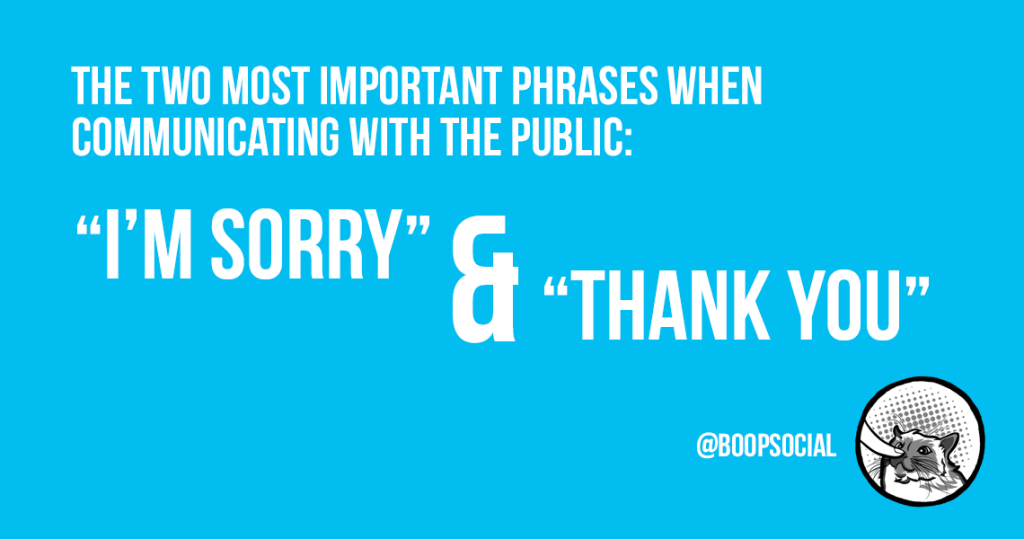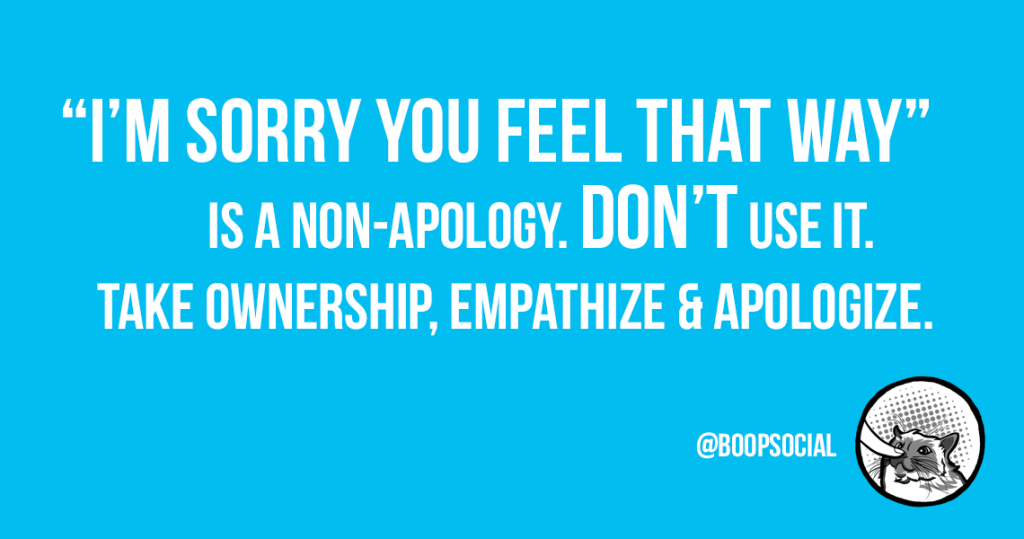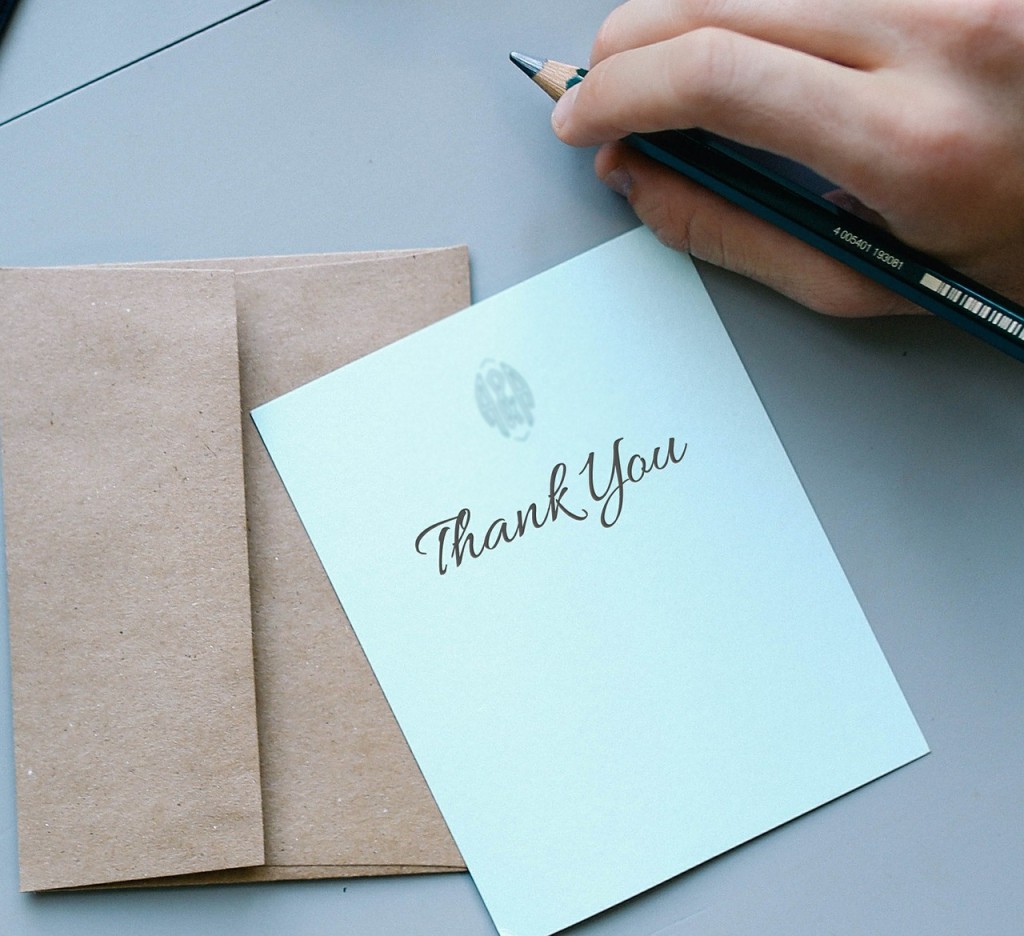The Two Most Important Phrases
There are two phrases that absolutely everyone working in a customer-centric role should be using regularly. Those two phrases are simple: ‘I’m sorry’ and ‘Thank you’.
Audience: CMs, CS, or anyone interacting with customers and/or the general public
“I’m Sorry”
Nothing helps defuse a stressful customer experience quicker than apologizing in a genuine way. While some customers will not be satisfied until the situation is completely resolved, the majority are just looking to be heard. Genuinely apologizing for their current issue or frustration will buy you a great deal of good will. Particularly if you’ve done a good job at establishing and highlighting the real people that are behind the communications for ‘the brand’. Feeling as though a real person genuinely cares about your problem is always going to go further than any automated response.
I cannot stress this enough: Even if the situation the customer in is 100% of their own doing, practicing empathy and genuinely apologizing for the frustration they’re currently feeling is seldom going to backfire. Most people just want to be heard, and to know that someone cares about their current situation. You can quickly defuse most anger by first offering a genuine apology. Depending on the situation and level of severity, failing to offer an apology can directly increase the level of customer frustration and anger.
On that note: NEVER say ‘I’m sorry you feel that way’. This phrase places the ownership of the problem onto the person experiencing the frustration. By using this phrase you’re not taking ownership of the situation. It’s a classic non-apology (if not *the* class non-apology), and will often significantly increase the level of frustration felt by the customer.
If you’re unsure on how to respond, here are a few examples:
“I’m so sorry for the frustration _name_, and thank you for your patience! Is there anything I can do to help?”
“My sincere apologies for the frustration _name_! I’d be happy to help troubleshoot this issue”
“Apologies for the frustration _name_! If you could please contact us at _cs email_, we’d be happy to look into this issue for you. Thank you for your patience!”
You’ll want to adapt these to your specific brand tone and voice, as well as ensure you’re addressing the correct issue. If the customer is experiencing a specific problem, referencing that in your response can help assure them that you are paying attention and not just reciting default script.
ex. “I’m sorry to hear you’re experiencing error code 2307 when trying to enter the game, Craig! If you haven’t already done so, could you please file a ticket with our customer support team at _link / email_ so they can help troubleshoot the issue further? Thank you for letting us know about this, we really appreciate the heads up!”
In some instances, you’ll need to message your larger audience en masse. In these instances, leading with an apology can negate much of the backlash that would otherwise follow.
ex. “Sincere apologies to everyone who currently isn’t able to access the game! The team is currently looking into the issue, and we will post another update when we have more information. Thank you for your patience while we work to resolve this situation. Also, a big thank you to everyone who has brought this to our attention, we really appreciate your assistance!”
It’s an extremely useful exercise to think through what situations your brand is likely to experience, and have a set of responses on hand for when they inevitably do. You’ll want to personalize these per response and ensure you’re responding to the correct issue, but having a prepared set of examples at hand is greatly beneficial and cost effective.
“Thank You”
If you’ve read through some of the examples up above, you will have spotted the second part of this article: Saying thank you. This is one of the easiest things you can do to bolster your customer satisfaction. Everyone likes to feel valued, and thanking your customers is one of the quickest ways to do just that.
When should you be thanking your customers? Whenever it makes sense!
A few examples:
Customers are frustrated about the server being down? “Thank you for your patience while we investigate…”
Crashing issue in one area & players let you know? “Thanks for the heads up everyone! We’re looking into this ASAP!”
Savvy customer helping field questions? “Thanks so much for the help _name_! Really appreciate it!”
Use catches a spelling error in your post? “Thanks for the catch _name_! I’ve gone ahead and edited the post”
Player posts a cool piece of fan art? “That’s so awesome, thanks so much for posting that _ player name_!”
Tons of RTs from your customers on a post? “Thanks for all the great RT love everyone! We really appreciate it!”
Thanking your community members can help ensure that they feel valued, and are likely to continue to support you in the future. Nothing is quite so disappointing as when an individual goes out of their way to try to report an issue, share something cool, or otherwise connect only to be met with silence. Is that person likely to interact again in the future? Are they going to trust that you’re listening and care about their participation?
It should be directly noted that this should not be reserved for positive feedback. You should absolutely being thanking your customers when they bring you bad news, alert you to larger issues, or otherwise call you out on your shit. And trust me, I get it, that can be really hard to do that sometimes. However, which would you prefer: Angry players who feel valued when you listen and respond by thanking them for alerting you to a problem… or silence?
Reinforcing that feedback is something you genuinely want, and are thankful for is HUGE. Showing your appreciation for your community is absolutely critical to building positive relationships long term. You wouldn’t put up with a friend that never said thank you or showed appreciation for your efforts, so why should your community?
In Closing
Your communications with your customers will vary depending on your brand, tone, and overall voice. Starting from a foundation which includes these two phrases will go a long way towards building a customer-centric approach. Make sure to include them in your responses where applicable and you’re well on the road to building genuine relationships with your community.
Questions? Comments? Wonderful haikus? Share them in the comments, or drop me a line on Twitter @boopsocial!
Enjoy these articles and want to see more? Consider backing me on Patreon!








